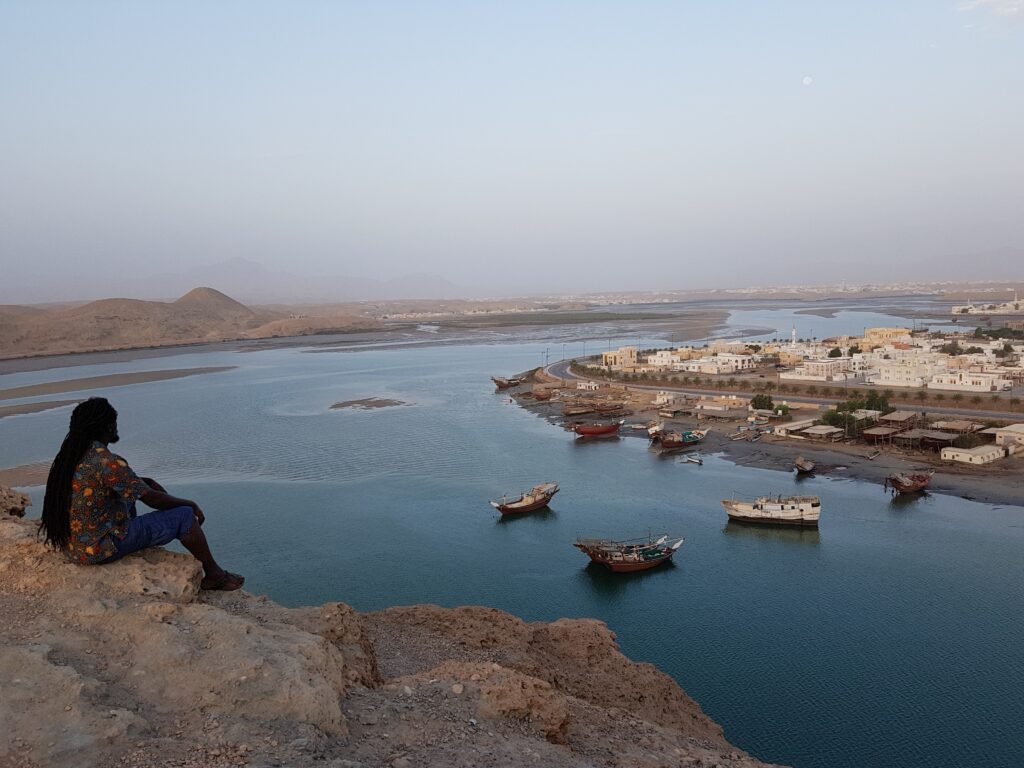By John Njenga Karugia
At the invitation of Gropius Bau and SAVVY Contemporary under the auspices of Berliner Festspiele, various artists, authors, musicians, filmmakers and thinkers participated in the international exhibition Indigo Waves and Other Stories: Re-Navigating the Afrasian Sea and Notions of Diaspora from 6 April until 13 August 2023. I was privileged to have been invited to showcase a section of my De:Link // Re:Link research at Humboldt University of Berlin coupled with earlier research focusing on the body of water referred to as Ziwa Kuu, the Swahili Sea, the Afrasian Sea, the Indian Ocean, Ratnakara, Eastern Ocean, Indic Ocean or Bahari Hindi that I had earlier engaged in, in the course of AFRASO research, a former BMBF research project at Goethe Frankfurt University (i).
For the exhibition’s curators – Natasha Ginwala, Bonaventure Soh Bejeng Ndikung and Michelangelo Corsaro – ‘the Indian Ocean serves as a communal horizon from which to read Afrasian histories of the forced and unforced movements that occurred historically through currents of coastal societies, water-borne kinship and mercantile imperialism’ (ii). They aimed to shed ‘light on the historical, cultural and linguistic links between the African and Asian continents’ and to respond to what they see as ‘a need to rethink the histories and processes of dispersion, and to reconsider notions of diaspora and cultural belonging’ (ii). The Indian Ocean ‘reveals shades of cultural, linguistic, political and historical passage from ancient times to the present’ (iii).’

John Njenga Karugia in the city of Sur, Oman, where traditional dhows have been produced for many centuries. ©John Njenga Karugia
Indigo Waves traced “links between the Asian and African regions, manifesting overlays and diasporic transfers between two areas of increased global political, economic and cultural importance in the 21st century” (iii). The exhibition was intended to take its visitors “from ancient routes of transregional exploration, trade and seasonal migration up through contemporary afroasiatic exchanges, from languages, sounds, waters, economies, philosophies and more” (iii). My section of the exhibition shared insights on transregional dynamics of cosmopolitan memory spaces across maritime silk roads within and beyond transregions where my research is based. I contributed a documentary film, photographs (a few are included in the gallery), conversations and presentations in at attempt to dissect intricate aspects of maritime memory cultures along the Maritime Silk Roads (MSR) which forms the sea route of the Belt and Road Initiative. During events organized at Gropius Bau and at SAVVY Contemporary within the course of the exhibition, my research showcased transregional memory politics dynamics across expansive transoceanic Afrasian and Afrabian spaces with examples from my research in Oman, Indonesia, China, Tanzania, India, Zanzibar, Pakistan and Kenya.
On 30 May 2023, I offered a reading and dialogue session at SAVVY Contemporary titled “Afrasian Memory Politics and Ethics” where I read from several of my own works as well as from works of other thinkers. The session was moderated by Hajra Haider Karrar. With a focus on the Belt and Road Initiative, the session reflected upon memory ethics and memory politics guided by the following questions: What memories connect Afrasian spaces and places and how did they emerge? What challenges exist within Afrasian spaces as regards how memories interact within various memory cultures across Afrasia? What can we learn about “doing memory” within cosmopolitan spaces? We debated the foregoing using examples of emergent memory places along the Belt and Road Initiative. For example, the ubiquitous memory of Chinese sailor Zheng He along the East African coast and how such memory simultaneously plays out within the BRI and within maritime cosmopolitanisms in East Africa and beyond (iv).
On 26 June 2023, I participated in a conversation moderated by Natasha Ginwala together with renowned author Yvonne Adhiambo Owuor at the Gropius Bau. It was titled ‘Aural Inheritances of the Swahili Seas’. We addressed the Swahili Ocean and Afrasian coastlines as repositories of diverse transcultural memory and ancestral belonging as we delved into literary, acoustic and scholarly practices of chronicling maritime cosmopolitanisms and communal histories while also remaining alert to more-than-human custodians of the sea. Our conversation engaged in calling forth the Swahili Seas’ multitudinous pasts and possible futures which include the newly Chinese-built Lamu Port as part of the Maritime Silk Roads of the Belt and Road Initiative (v).
The documentary film Afrasian Memories in East Africa exhibited at Gropius Bau emerged from a production collaboration between John Njenga Karugia at AFRASO and Ramadhan Khamis of Community Images. Ramadhan Khamis is one of East Africa’s most renowned documentary film-makers. The filming involved extensive travel across East Africa, the Indian Ocean and India. The film was launched during an AFRASO symposium titled ‘Afrasian Entanglements: Current Dynamics and Future Perspectives in India-Africa Relations’ at the University of Mumbai in June 2018.
The documentary film is available online on youtube. It captures transregional interactions that have produced complex cosmopolitan societies across the Afrasian Sea transregion. Individuals, communities, ethnic groups and nation-states exhibit a competition of memories as to who arrived in which territory first, who suffered more during certain atrocities, who participated or did not participate in which atrocities, who influenced which culture more, who made what contribution to whose culture more, or who should respect whose memory more and how. Such difficult and sometimes divisive dialogues are to be expected in a cosmopolitan space that has existed and constantly evolved across the ages. In such entangled spaces where shared imaginaries and memories of particular groups transcend the national scale or operate at a scale below it, it becomes imperative to investigate the complexities and tensions of scale (local, national, transareal, transregional, transnational and global).
At the ‘Africa’s Asian Options’ project at Goethe University Frankfurt (AFRASO), our main focus was contemporary relations among African and Asian societies across emergent Afrasian spaces. The film Afrasian Memories in East Africa emerged from our attempt at understanding imaginaries and memories that connect Africa and Asia, how these imaginaries and memories are produced and what they are used for within the Afrasian transregion. The film focuses on connective Afrasian memories while remaining sensitive towards connective Afrabian dynamics. Through interviews with various people, it delves into themes such as: the naming of the ocean, transoceanic trade, transculturality, colonialism, railway memories, identity politics, Kiswahili language politics, Afrabian solidarity politics, slavery memories and Bombay Africans’ Memories amongst others.
The following people appear in the film and we thank them profusely: Abdilatif Abdalla, Pheroze Nowrojee, Stambuli Abdillahi Nassir, Athman Hussein, Kuldip Sondhi, Ranjit Sondhi, Muhammad Mbwana, Mohamed Ali, Abdulrahman Bakathir, Mkuu Vae, Mbarak Abdulkadir, Hassan Mohamed, Amina Harith Swaleh, Kassim Mohamed, Dr. Kalandar Khan, Neera Kapur, Villoo Nowrojee, Siti Amina, Lorenz Herrmann, Athman Omar, Edwin Demla.
We also acknowledge the following organisations for diverse assistance: Asian African Heritage Trust, National Museums of Kenya, Nairobi Railway Museum, The Reef Hotel Mombasa, Siti & The Band – Zanzibar, Gedi Ruins Museum, Rabai Museum, Swahili Hub Mombasa, University of Mumbai – India, Dhow Countries Music Academy – Zanzibar, Centre for Interdisciplinary African Studies – ZIAF, Frankfurt Memory Studies Platform – FSMP, Africa’s Asian Options (AFRASO) – Germany, Goethe University Frankfurt.
The film was conceptualized within the AFRASO Indian Ocean Imaginaries and Memories Research Project at Goethe University Frankfurt by a team that consisted of: Dr. John Njenga Karugia, Prof. Dr. Astrid Erll and Prof. Dr. Frank Schulze-Engler.
The educational documentary film was fully sponsored by the German Federal Ministry of Education and Research and is available free of charge to viewers across the world. I am currently making a Silk Roads documentary film based on my current De:Link // Re:Link BRI research which is also sponsored by the German Ministry of Education and Research (BMBF).
Images below credits ©John Njenga Karugia.
References
(i) Ruth Achenbach, Jan Beek, John Njenga Karugia, Rirhandu Mageza-Barthel and Frank Schulze-Engler (2020): Afrasian Transformations Transregional Perspectives on Development Cooperation, Social Mobility, and Cultural Change. Leiden/Boston: Brill.
(iv) Njenga Karugia (2023): ‘Provincializing European memory: transregional heritage politics and memory ethics across China’s Belt(s) and Road(s) Initiative(s)’. In Mälksoo, Maria (ed.): Handbook on the Politics of Memory. Edward Elgar Publishing.
(v) ‘Chinese-built Lamu Port in Kenya starts operations’, Xinhua, 21 May 2021
(vi) De Cesari, Chiara and Rigney, Ann (eds) (2016): Transnational Memory: Circulation, Articulation, Scales. De Gruyter. doi.org/10.1515/9783110359107.
